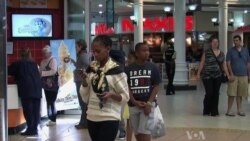JOHANNESBURG —
The size of South Africa’s black middle class has more than doubled in less than a decade, according to a new study from the University of Cape Town. This emerging class is a boon to the growing economy, but members of this up-and-coming group say many challenges remain.
The Unilever Institute of Strategic Marketing says the black middle class is now 4.2 million people strong, up from 1.7 million in 2004.
And many say their status is hard-won.
"I just started to work hard, you know, basically to have the sort of values that will see you putting your nose to the grindstone, giving your best, that sort of thing," Abdeel said.
Spending by Abdeel and other members of the black middle class is estimated at more than $44 billion a year -- eclipsing white middle class spending, which is stagnating.
While the middle class is still a small part of South Africa's 52 million people, researchers say it is significant - especially after decades of inequality under apartheid.
The Cape Town researchers said middle-class households make between $1,800 and $5,500 a month.
Professor John Simpson, who headed the study, says the growth of the black middle class could improve South Africa's economy.
"For me, it is the one shining light in an otherwise quite a dismal world. And so, our country's economy hasn't grown since 2008 in quite the way we thought it would. But this group can actually make it grow further," Simpson said.
Thabang Ramogase, a marketer, says companies need to understand this emerging class before trying to sell to them.
"People think that just because you're black middle class, your destination is to become like white people. And that's far from it. If anything, you just want the stuff that white people have. And some of that stuff; not all of it as well. There's a lot of mixing and matching. There's some things I'll take and some things I won't take as a black middle-class consumer. That's the first thing. So: don't want to be white," Ramogase said.
The second point, he says, is that the black middle class is constantly evolving. That has left some marketers and retailers playing catch-up to this young, hip demographic.
Yet inequalities remain -- and many South Africans still live in crushing poverty. And some new members of the middle class say they're already disillusioned with their government.
"It encourages people to be corrupt. It doesn't encourage middle class. It doesn't encourage people to work. Because, the more you work, the more you get taxed," Pheko said.
However, other up-and-coming black South Africans, like advertising account manager Belinda Mangila, say they’re optimistic.
"I think we still have a long way to go. And I think the future is bright for anyone in this country," Mangila said.
Today, South Africa's emerging middle black class is asking for more -- more from the government, more from their service providers, and more from the companies that market to them.
Thuso Khumalo also contributed to this report.
The Unilever Institute of Strategic Marketing says the black middle class is now 4.2 million people strong, up from 1.7 million in 2004.
And many say their status is hard-won.
"I just started to work hard, you know, basically to have the sort of values that will see you putting your nose to the grindstone, giving your best, that sort of thing," Abdeel said.
Spending by Abdeel and other members of the black middle class is estimated at more than $44 billion a year -- eclipsing white middle class spending, which is stagnating.
While the middle class is still a small part of South Africa's 52 million people, researchers say it is significant - especially after decades of inequality under apartheid.
The Cape Town researchers said middle-class households make between $1,800 and $5,500 a month.
Professor John Simpson, who headed the study, says the growth of the black middle class could improve South Africa's economy.
"For me, it is the one shining light in an otherwise quite a dismal world. And so, our country's economy hasn't grown since 2008 in quite the way we thought it would. But this group can actually make it grow further," Simpson said.
Thabang Ramogase, a marketer, says companies need to understand this emerging class before trying to sell to them.
"People think that just because you're black middle class, your destination is to become like white people. And that's far from it. If anything, you just want the stuff that white people have. And some of that stuff; not all of it as well. There's a lot of mixing and matching. There's some things I'll take and some things I won't take as a black middle-class consumer. That's the first thing. So: don't want to be white," Ramogase said.
The second point, he says, is that the black middle class is constantly evolving. That has left some marketers and retailers playing catch-up to this young, hip demographic.
Yet inequalities remain -- and many South Africans still live in crushing poverty. And some new members of the middle class say they're already disillusioned with their government.
"It encourages people to be corrupt. It doesn't encourage middle class. It doesn't encourage people to work. Because, the more you work, the more you get taxed," Pheko said.
However, other up-and-coming black South Africans, like advertising account manager Belinda Mangila, say they’re optimistic.
"I think we still have a long way to go. And I think the future is bright for anyone in this country," Mangila said.
Today, South Africa's emerging middle black class is asking for more -- more from the government, more from their service providers, and more from the companies that market to them.
Thuso Khumalo also contributed to this report.





